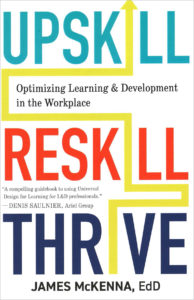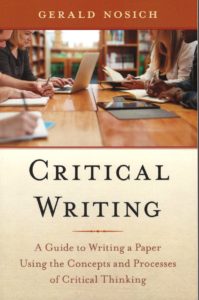This time we look at two books that are focused on people. One designed to make skill improvements more effective, the other on making a solid and convincing argument. Both are important books for the modern facility officer. Enjoy reading them.
UPSKILL, RESKILL, THRIVE: OPTIMIZING LEARNING & DEVELOPMENT IN THE WORKPLACE
McKenna, James, CAST, Inc., Wakefield, MA, $28, softcover, 159 pages.
 If it wasn’t obvious already, I’m a strong advocate of life-long learning. With that comes life-long teaching or helping the next generation to learn and become smarter and better. James McKenna provides some excellent examples of life-long learning, and teaching, opportunities in Upskill, Reskill, Thrive.
If it wasn’t obvious already, I’m a strong advocate of life-long learning. With that comes life-long teaching or helping the next generation to learn and become smarter and better. James McKenna provides some excellent examples of life-long learning, and teaching, opportunities in Upskill, Reskill, Thrive.
One of the many recommendations made is to ‘know your learners’. We’re fortunate in higher education facility management is our audience is diverse but focused. Well led organizations include a training manager or other individual charged with identifying, and in some cases providing, continuing education programs to keep employees sharp, in compliance with regulations, and opportunities to advance. Upskill provides a clear map to ensure continuing education is valuable and in demand.
McKenna accomplishes these important goals by applying the principles of Universal Design for Learning developed by the Center for Applied Special Technology (CAST). He does this by describing how to connect with the learners, choosing the environment for learning, focusing on the learning, and making connections for effective learning. Each of the eight chapters describes methods to accomplish the goals of the chapter, some with references to the CAST guidelines about effective learning. Summary material in each chapter includes additional resources and, in most cases, an extensive list of references for additional reading and supporting research.
The material presented is valuable even to traditional teachers because of its approach to engaging with learners who are frequently well educated. Since so many of the workers in our organizations are professionals in their specific field making the connections with them is important for the continuing education programs that will make our individual organizations better.
Upskill, Reskill, Thrive is an excellent book for APPA members who are charged with providing continuing education for their organization either through APPA programs or individually designed and delivered programs. It is a well-organized, compelling read even if you do not have responsibilities for continuing education delivery.
CRITICAL WRITING: A GUIDE TO WRITING A PAPER USING THE CONCEPTS AND PROCESSES OF CRITICAL THINKING
Nosich, Gerald, Rowman & Littlefield, NewYork, 2022, 242 pages, softcover, $64.
 The amount of data and complex issues in facility management are seldom exceeded by other fields. There are issues of staffing, energy efficiency, construction costs, component life cycles, commodity expenses, renovation options, inflation, and so on. It’s enough to make a facility officer’s head spin. Think about how an executive feels when presented with all the possible options in an annual operating budget proposal or capital expenditure. There are both demands for clarity and thoughtful presentation, often in writing. That’s where Gerald Nosich’s book, Critical Writing is essential.
The amount of data and complex issues in facility management are seldom exceeded by other fields. There are issues of staffing, energy efficiency, construction costs, component life cycles, commodity expenses, renovation options, inflation, and so on. It’s enough to make a facility officer’s head spin. Think about how an executive feels when presented with all the possible options in an annual operating budget proposal or capital expenditure. There are both demands for clarity and thoughtful presentation, often in writing. That’s where Gerald Nosich’s book, Critical Writing is essential.
It’s one thing to think about issues critically, consideration of the problem, evaluation of the options, and selection of the preferred option but then explaining the process without putting the reader to sleep, forcing them to reach for an aspirin, or drop-kicking the report to an unsuspecting aide, requires talent, thought, and organization. That’s what Critical Writing is about. As with every well-written document, it follows a process which is iterative, focused, and open to improvement.
That’s the way Critical Writing is organized. Dive in, develop the plan to present the issues and arrive at the solution. Ensure the facts are identified and organized using a step-by-step process moving from one perspective (big or little) to the next (little or big). Getting the data organized can help answer the problem all by itself by identifying the data to use that will make a compelling argument. However, data is not the only step; developing a plan to use the data is essential as well.
Once the written recommendations begin to congeal, considering the opposite side of the argument is an essential step. Critical Writing provides some recommendations to identify the weaknesses of the argument or arguments against the recommendation. Considering the pros and cons of an issue are an essential part of critical thinking and presenting them in a clear manner is provided in a clear and methodical manner.
Once the writer achieves the ‘perfect’ recommendation, it is essential to read through the recommendation and address the mundane issues of spelling and grammar. While these mechanical issues may feel irrelevant with our modern tools, it’s still necessary and Critical Writing provides a clear process.
While some may think ‘this book doesn’t apply to me’ I disagree. If you aspire to a higher position or want to be respected in your current position, being able to write critically and demonstrate you critical thinking, is essential. Critical Writing provides the necessary steps and recommendations to be a better facility officer and achieve your goals whether personal or organizational.
Ted Weidner is professor of engineering practice at Purdue University, West Lafayette, IN, and consults on facilities management issues, primarily for educational organizations. He can be reached at [email protected]. If you would like to write a book review, please contact Ted directly.
Bookshelf
Book reviews on current publications relevant to the profession, trends, and working environment of facilities and educational managers and professionals. To contribute a book review, contact Ted Weidner, field editor of this column.
See all Bookshelves.


